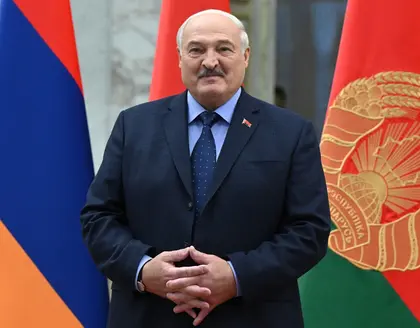South Korean President Yoon Seok-Yeol in a phone call with NATO Secretary General Mark Rutte said his country will take action to respond to North Korea’s recent dispatch of combat troops to fight in Ukraine, according to major South Korean media on Monday.
Yoon told the Head of the Alliance that South Korean intelligence confirmed that North Korea has initiated deployment of at least 1,500 elite commandos to Russia for service in Ukraine, a dramatic escalation by Pyongyang following previous substantial support to the Kremlin.
JOIN US ON TELEGRAM
Follow our coverage of the war on the @Kyivpost_official.
The conservative Dong-A Ilbo newspaper headline read: “Yoon: ‘Russia-North Korea Military Closer, Threat to World Peace… We Will Not Sit Back.’” It said that Yoon told Secretary Rutte South Korea would react to North Korea’s “reckless military escalations (that) are fundamentally shaking the international order and threatening peace on the Korean Peninsula and the world, and that our government will never sit idly by.”
South Korean media widely covered a post by Rutte on X / Twitter on Monday in which he said that he had telephoned Yoon “to share concerns” regarding North Korean troops being sent to Russia. Discussions focused on “defense industrial cooperation and the interconnected security of the Euro-Atlantic and Indo-Pacific regions,” the English language Korea Times reported.

Lukashenko: Belarus’s Unpredictable Autocrat and Putin Sidekick
South Korea’s national intelligence service (NIS) had on Friday made public text, photographs and video that agency said was solid evidence that North Korean leader Kim Jong-un had dramatically heightened his country’s assistance to Russia in its war against Ukraine, by sending combat troops.
Ukraine’s HUR main intelligence directorate in statements made over the weekend largely confirmed the South Korean intelligence reports.
According to some, unconfirmed, Ukrainian military information platforms, the total North Korean troop commitment may number as many as 12,000 men, almost ten times the size of the force reported by South Korea’s NIS.
“President Yoon said that our government…hopes to seek practical countermeasures together with NATO and its member countries in the process.”
Wire service outlets in Seoul led by the major Yonhap news agency reported on Monday that Russian Ambassador Georgy Zinoviev had been summoned for a meeting with Vice South Korean Foreign Minister Kim Hong Kyun who “condemned in the strongest terms” North Korea’s troop dispatch to Russia, which poses “a grave security threat” to South Korea and the international community.
The Foreign Ministry confirmed the Monday meeting had taken place and the official message given to the Kremlin via its head in country diplomat. Zinoviev’s response, if any, was not reported.
North Korea initiated major military assistance to Russia, sending a reported 1.5 million artillery shells and dozens of surface-to-surface missiles for attacks against Ukrainian troops, homes and businesses in mid-2023. The still-ongoing deliveries directly violate United Nations sanctions on arms transfers involving North Korea.
According to analysts Pyongyang’s shipments of artillery ammunition, accounted for more than a third of all munitions fired by Russian forces invading Ukraine in the past 18 months, which has helped Moscow’s forces to outshoot Ukrainian units by as much as ten shells to one.
Ukraine has struggled to find ammunition supplies of its own among allies because of US unwillingness to commit major resources to Ukrainian armaments and disorganized European manufacturing efforts. South Korea is a major shell manufacturer and has generally supported Ukraine but, in line with longstanding government policy, does not export munitions to a country actually at war.
An analytical article in Dong-A Ilbo reported Seoul may reverse that ban were the “destabilizing” North Korean commitment of troops and weapons to Russia for combat in Ukraine to continue or increase.
South Korea currently manufactures about 200,000 155mm caliber rounds annually, and along with significant amounts of other munitions of critical need for Ukrainian forces, the article said.
Yoon’s administration in June condemned the signing of a North Korea-Russia arms and military exchange treaty upgrading security cooperation between the two countries, and in official statement warned that Seoul could “revisit” the ban on providing lethal weapons to warring nations.
A cross-government legal review of issues connected with a possible exception to the export ban being made if it was confirmed there were serious threats to South Korean national security once completed, could lead to South Korea exporting weapons or ammunition to Ukraine directly, the report said.
The US worked with the Yoon administration to indirectly send over 300,000 155-millimeter artillery ammunition to Ukraine in 2023. Some were highly effective cluster munition shells; an anti-personnel weapon Ukrainian gunners have found to be effective against dense Russian infantry assaults.
To date, South Korea has sent Ukraine non-lethal weapons including trucks, protective suits and mine-clearing equipment.
You can also highlight the text and press Ctrl + Enter










